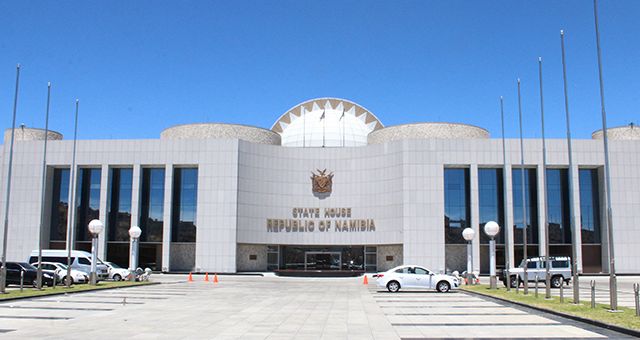COPIOUS rains that resulted in flooding in parts of Windhoek last weekend will cost the City an estimated N$5,6 million in repairs to damaged infrastructure, according to the Mayor and other officials.
In addition to the infrastructural damage, which includes road surfaces, water lines and sewage systems, many residents of the capital, particularly in the Dorado Park suburb, have also suffered loss and damage to their homes and property. A fund, which has been set up to help the City to repair damage, will also go towards assisting flood victims.Although about 40 families suffered losses during the heavy rains, and although there will be quite considerable cost involved in infrastructural rehabilitation in the wake of these rains, it can also be said that loss of life and damage to infrastructure and property could have been far worse than it was, and in some ways the capital has got off lightly.There are those who maintain, in some cases quite correctly, that the damage could have been further limited by stricter municipal regulations on, for example, dumping of waste and refuse and clearing of riverbeds and courses.This natural ‘disaster’ does serve as a warning to us all that environmental awareness is vitally important, especially at times like this.And although a ‘flood’ is not something that happens with any kind of regularity in our country, it is nevertheless an eventuality that has to be prepared for, when and if it comes again.Of the 40 families who suffered damage and loss during the flooding, 16 have been forced to leave their homes.It is obviously a good thing that the City and others come forward to assist those in need, but at the same time we would appeal for consultation and consolidation in this regard, for already other ‘funds’ are coming into existence; and someone needs to account for how the money is spent and which families it is given to on a properly-managed basis.The flooding, for once, did not affect the totally destitute – the homeless and the jobless – but affected in particular homeowners in a certain low-lying development on the banks of the Arebbusch River.Any fundraising effort needs to target those with the least resources and insurance to cover the costs of damage; and the fund needs to be properly administered and managed, and arrangements made for monies that are left once people have been assisted.Perhaps efforts should be co-ordinated through the Municipal fund to promote accountability in the long run, rather than through a series of smaller funds set up by individuals and which could be open to abuse.On the infrastructural level, the Municipality does need to address the issue of dumping, particularly in riverbeds, which is unsightly at the best of times, but which can also precipitate disaster when it comes to a season of heavy rains.At the end of the day, without diminishing the losses and damage that people and property have sustained; and even taking into account the fact that aspects of our infrastructure will be in need of repairs, that the combined cost of these, compared with the benefits to our city and environs of the excellent rains that have fallen this January, is still negligible.What we need to do in future is ensure, that when and if this happens again, that the city and its people are better prepared to withstand, or at least minimise, the negative effects of flooding.A fund, which has been set up to help the City to repair damage, will also go towards assisting flood victims. Although about 40 families suffered losses during the heavy rains, and although there will be quite considerable cost involved in infrastructural rehabilitation in the wake of these rains, it can also be said that loss of life and damage to infrastructure and property could have been far worse than it was, and in some ways the capital has got off lightly. There are those who maintain, in some cases quite correctly, that the damage could have been further limited by stricter municipal regulations on, for example, dumping of waste and refuse and clearing of riverbeds and courses. This natural ‘disaster’ does serve as a warning to us all that environmental awareness is vitally important, especially at times like this. And although a ‘flood’ is not something that happens with any kind of regularity in our country, it is nevertheless an eventuality that has to be prepared for, when and if it comes again. Of the 40 families who suffered damage and loss during the flooding, 16 have been forced to leave their homes. It is obviously a good thing that the City and others come forward to assist those in need, but at the same time we would appeal for consultation and consolidation in this regard, for already other ‘funds’ are coming into existence; and someone needs to account for how the money is spent and which families it is given to on a properly-managed basis. The flooding, for once, did not affect the totally destitute – the homeless and the jobless – but affected in particular homeowners in a certain low-lying development on the banks of the Arebbusch River. Any fundraising effort needs to target those with the least resources and insurance to cover the costs of damage; and the fund needs to be properly administered and managed, and arrangements made for monies that are left once people have been assisted. Perhaps efforts should be co-ordinated through the Municipal fund to promote accountability in the long run, rather than through a series of smaller funds set up by individuals and which could be open to abuse. On the infrastructural level, the Municipality does need to address the issue of dumping, particularly in riverbeds, which is unsightly at the best of times, but which can also precipitate disaster when it comes to a season of heavy rains. At the end of the day, without diminishing the losses and damage that people and property have sustained; and even taking into account the fact that aspects of our infrastructure will be in need of repairs, that the combined cost of these, compared with the benefits to our city and environs of the excellent rains that have fallen this January, is still negligible. What we need to do in future is ensure, that when and if this happens again, that the city and its people are better prepared to withstand, or at least minimise, the negative effects of flooding.
Stay informed with The Namibian – your source for credible journalism. Get in-depth reporting and opinions for
only N$85 a month. Invest in journalism, invest in democracy –
Subscribe Now!










